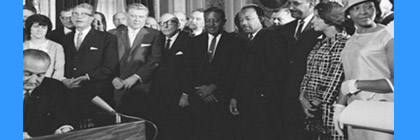I first started my career with the ACLU as a voting rights attorney with our National office. In that role, I had the privilege of representing African-American voters who were challenging restrictive voter laws, namely voter ID, and most of my clients grew up in the segregated South. They vividly remembered the inhumanity of Jim Crow laws, especially those that made it impossible for African-Americans to vote and elect candidates of their choice.
One of my former clients, Rev. Peter Johnson based in Texas, was one of Dr. Martin Luther King Jr.’s foot soldiers. At the age of 13, Rev. Johnson taught other blacks how to read at the bottom of his uncle’s church so they could pass Louisiana’s literary tests to vote. He recounted stories of how more affluent African-Americans would station themselves in front of polling places and pay the poll tax of any citizen brave enough to attempt to vote.
Other elderly clients of mine in South Carolina who could not even read or write stood up to challenge South Carolina’s 2011 voter ID law as a violation of the Voting Rights Act of 1965 (VRA). They had been voting for decades without an ID, without the ability to read or write, and with little funds, and now South Carolina effectively wanted to make all of that a requirement for them to continue voting. The threat to their fundamental right was so clear that the courts in Texas and South Carolina who heard these voter ID cases prohibited those laws from going into effect for the upcoming elections that year.
These stories have stayed with me, along with the handful of cotton one of my clients picked from a field and gave to me as a reminder of why I, as an African-American woman and lawyer, should never forget the struggle that was waged so that I could be in this position today.
Today marks the 50th anniversary of the signing of the VRA. There is no question that in its half century of effect, the VRA paved the way to make our nation’s goal of democracy a reality for everyone.
One of my proudest moments was representing the Alabama NAACP as a party in the case Shelby County, Alabama v. Holder. Although the Supreme Court in Shelby County struck down a key provision of the Voting Rights Act that served as a buffer against discriminatory efforts to strip away voting rights away (Section 5), the fact that the ACLU, the NAACP and so many other groups joined forces was a testament to the spirit of those who came before us to make the VRA a reality.
The VRA is without a doubt one of the most successful pieces of civil rights legislation, and the ACLU took a leading role in bringing cases under the VRA which resulted in increased voter registration, turnout in several places, and the election of minority candidates at numbers not seen before. But, instead of reaffirming the success and continuing importance of this law, the Supreme Court and others have been unrelenting in their campaign to dismantle it and, by consequence, dismantling whole communities. We, as defenders of democracy, must also remain unrelenting in our efforts to reinstate Section 5’s force and effect, and to counter the rhetoric claiming that race no longer matters and civil rights laws are no longer necessary.
In Florida, the ACLU continues that work by defending voting rights in a State wrought with election administration problems, and we continue to strengthen our ties with community leaders and grassroots organizations dedicated to improving the lives of Floridians through the ballot box. As we prepare for the 2016 elections, we must remain at the forefront in protecting the fundamental right to vote, especially now that we don’t have the full force and effect of the Voting Rights Act’s protections.
Date
Thursday, August 6, 2015 - 11:39amFeatured image

